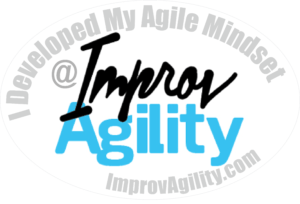 I had the opportunity to do a bit of improv recently with Robie Wood, his brother Jodie and a few other willing and brave participants. (And much to my surprise, in no way did any of us make complete arses of ourselves.)
I had the opportunity to do a bit of improv recently with Robie Wood, his brother Jodie and a few other willing and brave participants. (And much to my surprise, in no way did any of us make complete arses of ourselves.)
The Brothers Wood have recently started offering “ImprovAgility” workshops in NYC, with the promise:
“Improv Agility workshops are focused on Agile mindset and behavior skill development using experiential training techniques from Improvisational Theater.”
They advised us that past participants have described their experiences as “skill-building, inspiring and a great deal of fun.”
And I must say, I agree 100%.
A little nonsense now and then, is cherished by the wisest men - Roald Dahl Share on X
Over the course of about two hours, we were coached through a number of different improv practices:
- Zip Zap Zop
- Yes, and…
- Funny you should mention that…
- One word
- Crocodile
- Two sentences
- And more…
I got to see first hand how those techniques can help build skills that transfer directly into everyday business situations – especially ones based on an Agile culture.
 Improv Develops Everyday Agile Skills
Improv Develops Everyday Agile Skills
Listening
- Minimizing interruptions
- Ending multitasking
- Taking people away from working off of internal agendas
- Creating a situation of fluidity
Adaptability
- Surrendering the need to be ‘right’ creates tolerance
- Being open to change provides a nimbleness of thought
- Allowing for innovation to emerge
Seeing opportunity
- Allowing one to see different perspectives
- Improving problem solving
- Giving things the space to work before we start poking holes on why they ‘won’t’
- Increasing collaboration
Supporting each other
- Increasing trust
- Improving cooperation
- Developing empathy
- Creating space for ambiguity and paradox
Come Out and Play
By imposing constraints (like “Yes, and”), improv calls on the human in all of us to come out and play.
Which can be uncomfortable at first for some. Juan Gabardine, an agile coach, explains the reason for that:
“Technical people sometimes think that anything that is too human is not serious. It’s not appropriate… ”
And those folks think: play time, well that’s not serious at all. How can that be of any help?
Brain Science Behind Playtime
Edward M. Hallowell, a psychiatrist who specializes in brain science, explains why play has such a positive effect:
“The brain’s executive functions include planning, prioritizing, scheduling, anticipating, delegating, deciding, analyzing— in short, most of the skills any [one] must master in order to excel in business. And play stimulates the parts of the brain involved in both careful, logical reasoning and carefree, unbound exploration.”
Given that, it is hardly surprising that breakthroughs in thinking about a complex emergent system take place during times of serious play.
Play doesn’t just help us to explore what is essential. It is essential in & of itself. Share on XYes, and if you want to improve skills including: individual and team collaboration, self-organization, leadership, learning ability and adaptability, try a little bit of non-seriousness.
As Roald Dahl said, “A little nonsense now and then, is cherished by the wisest men.”
Recommended Reading




